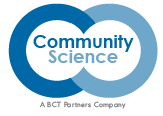For the last three years, Community Science has been at the forefront of the battle against misinformation about the efficacy and safety of vaccines by assisting the US Department of Health and Human Services National Vaccine Program Office (NVPO), recently renamed as the Office of Infectious Disease and HIV AIDS Policy, to develop and disseminate communications that provide accurate, timely, transparent, and audience-appropriate information about vaccines.
NVPO offers unbiased advice and expertise to other federal agencies in identifying and responding to gaps in the vaccine system, making vaccines safer and more effective, with the end goal to reduce the burden of preventable infectious disease throughout the country. Community Science and its subcontractor (Communicate Health) provide NVPO with materials on vaccines designed to help people make — and feel confident making — decisions about vaccinations for themselves and their families. In addition to general communications support, Community Science staff developed an index to measure vaccine confidence — informed by a review of the literature and a technical expert panel — followed by the development of index measures and implementation of a survey designed to assess the reliability and validity of the index. In addition, Community Science designed and implemented a qualitative study to explore the barriers, motivators, personal belief systems, and social context that influence young African American and Hispanic and Latino adults’ decisions to get the influenza vaccine —populations with the greatest disparities. Collectively, these project activities are helping to develop informational messages to counter antivaccine misinformation campaigns that have plagued social media sites over the last few years and that contribute to the outbreaks in measles and other infectious diseases.
“The survey and the qualitative study findings on vaccine hesitancy have given us some great ideas for how to communicate with young minority adults on the benefits of getting vaccinated. Basing the messages in individuals’ culture increases the chances that the messages will resonate with them and will be more likely to act on the information and get vaccinated.”
—Ann Aiken
